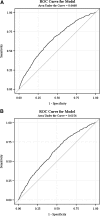Hospital readmission in general medicine patients: a prediction model
- PMID: 20013068
- PMCID: PMC2839332
- DOI: 10.1007/s11606-009-1196-1
Hospital readmission in general medicine patients: a prediction model
Abstract
Background: Previous studies of hospital readmission have focused on specific conditions or populations and generated complex prediction models.
Objective: To identify predictors of early hospital readmission in a diverse patient population and derive and validate a simple model for identifying patients at high readmission risk.
Design: Prospective observational cohort study.
Patients: Participants encompassed 10,946 patients discharged home from general medicine services at six academic medical centers and were randomly divided into derivation (n = 7,287) and validation (n = 3,659) cohorts.
Measurements: We identified readmissions from administrative data and 30-day post-discharge telephone follow-up. Patient-level factors were grouped into four categories: sociodemographic factors, social support, health condition, and healthcare utilization. We performed logistic regression analysis to identify significant predictors of unplanned readmission within 30 days of discharge and developed a scoring system for estimating readmission risk.
Results: Approximately 17.5% of patients were readmitted in each cohort. Among patients in the derivation cohort, seven factors emerged as significant predictors of early readmission: insurance status, marital status, having a regular physician, Charlson comorbidity index, SF12 physical component score, >or=1 admission(s) within the last year, and current length of stay >2 days. A cumulative risk score of >or=25 points identified 5% of patients with a readmission risk of approximately 30% in each cohort. Model discrimination was fair with a c-statistic of 0.65 and 0.61 for the derivation and validation cohorts, respectively.
Conclusions: Select patient characteristics easily available shortly after admission can be used to identify a subset of patients at elevated risk of early readmission. This information may guide the efficient use of interventions to prevent readmission.
Trial registration: ClinicalTrials.gov NCT00204048.
Figures
Similar articles
-
Derivation and validation of an index to predict early death or unplanned readmission after discharge from hospital to the community.CMAJ. 2010 Apr 6;182(6):551-7. doi: 10.1503/cmaj.091117. Epub 2010 Mar 1. CMAJ. 2010. PMID: 20194559 Free PMC article.
-
Potentially avoidable 30-day hospital readmissions in medical patients: derivation and validation of a prediction model.JAMA Intern Med. 2013 Apr 22;173(8):632-8. doi: 10.1001/jamainternmed.2013.3023. JAMA Intern Med. 2013. PMID: 23529115
-
Factors associated with unplanned readmissions in a major Australian health service.Aust Health Rev. 2019 Feb;43(1):1-9. doi: 10.1071/AH16287. Aust Health Rev. 2019. PMID: 29092726
-
Inflammatory Bowel Disease: Predictors and Causes of Early and Late Hospital Readmissions.Inflamm Bowel Dis. 2017 Oct;23(10):1832-1839. doi: 10.1097/MIB.0000000000001242. Inflamm Bowel Dis. 2017. PMID: 28858068
-
Risk prediction models for hospital readmission: a systematic review.JAMA. 2011 Oct 19;306(15):1688-98. doi: 10.1001/jama.2011.1515. JAMA. 2011. PMID: 22009101 Free PMC article. Review.
Cited by
-
Using Machine Learning Models to Identify Factors Associated With 30-Day Readmissions After Posterior Cervical Fusions: A Longitudinal Cohort Study.Neurospine. 2024 Jun;21(2):620-632. doi: 10.14245/ns.2347340.670. Epub 2024 May 20. Neurospine. 2024. PMID: 38768945 Free PMC article.
-
Can prediction models for hospital readmission be improved by incorporating patient-reported outcome measures? A systematic review and narrative synthesis.Qual Life Res. 2024 Jul;33(7):1767-1779. doi: 10.1007/s11136-024-03638-8. Epub 2024 Apr 30. Qual Life Res. 2024. PMID: 38689165 Review.
-
Automated Text Message-Based Program and Use of Acute Health Care Resources After Hospital Discharge: A Randomized Clinical Trial.JAMA Netw Open. 2024 Apr 1;7(4):e243701. doi: 10.1001/jamanetworkopen.2024.3701. JAMA Netw Open. 2024. PMID: 38564221 Free PMC article. Clinical Trial.
-
Identifying the Prevalence and Causes of 30-Day Hospital Readmission in Children: A Case Study from a Tertiary Pediatric Hospital.Glob J Qual Saf Healthc. 2023 Nov 24;6(4):101-110. doi: 10.36401/JQSH-23-17. eCollection 2023 Nov. Glob J Qual Saf Healthc. 2023. PMID: 38404457 Free PMC article.
-
Does a Community Care programme reach a high health need population and high users of acute care hospital services in Melbourne, Australia? An observational cohort study.BMJ Open. 2023 Sep 26;13(9):e077195. doi: 10.1136/bmjopen-2023-077195. BMJ Open. 2023. PMID: 37751947 Free PMC article.
References
-
- McDonald KM, Sundaram V, Bravata DM, et al. Closing the quality gap: a critical analysis of quality improvement strategies. Volume 7: Care Coordination. AHRQ Publication No. 04(07)-0051-7. Rockville, MD: Agency for Healthcare Research and Quality; 2007. Available at www.ahrq.gov/downloads/pub/evidence/pdf/caregap/caregap.pdf. Accessed November 9, 2009. - PubMed
-
- Frankl SE, Breeling JL, Goldman L. Preventability of emergent hospital readmission. Am J Med. 1991;90:667–674. - PubMed
Publication types
MeSH terms
Associated data
Grants and funding
LinkOut - more resources
Full Text Sources



